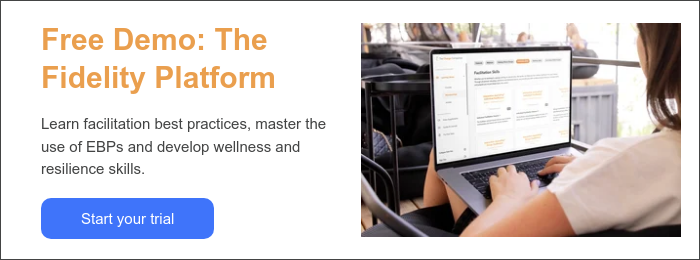Introducing The Change Companies’ Career Exploration Curriculum

Employment readiness can be a major barrier to success and personal growth for a broad range of people. Justice-involved populations1, people entering treatment6, people struggling with socioeconomic and mental health challenges and underserved youth4 are a few groups particularly affected by this barrier.
The benefits of career readiness programs
Research has demonstrated that well-designed career readiness programs can be an effective launching pad for better life outcomes, including reduced recidivism7, long-term recovery maintenance3 and overall well-being2. Research also shows that people often need more than vocational training alone to be successful, and that the greatest benefit comes from programs that promote engagement, skill-based learning and soft skill development8. Most of all, people benefit from programs that enhance their self-efficacy – their belief in their ability to use their strengths and skills to not only find a job, but to thrive in a high-quality career3,5.
The Career Exploration curriculum from The Change Companies allows participants to explore how their current strengths, skills and interests align with a career path. Participants develop a plan for pursuing their identified career path and learn strategies to experience success in applying for, getting and keeping a job. The program offers opportunities for practice, application and hands-on learning while boosting participants’ confidence and skills.
Across three modules, participants gain the following:
1. In Exploring My Career Path, participants learn about the valuable strengths, skills and interests they already possess that can help them overcome employment barriers and move forward on their career path. Objectives include:- Exploring motivating factors for improving job skills and working toward career goals
- Identifying barriers to employment and learning strategies for overcoming them
- Identifying core strengths that can be helpful in a future workplace
- Looking at common skill sets that are valued in many jobs
- Using a validated interest inventory to identify top interests
- Setting SMART goals and identifying next steps
- Learning about jobs that align with top interest areas
- Learning how to develop helpful patterns of thinking to achieve desired outcomes
- Gaining skills for building out a professional network
- Applying helpful job search strategies
- Filling out a job application
- Creating effective cover letters and resumes
- Effectively preparing for a successful interview
- Negotiating salary
- Experiencing success in the first days and weeks at a new job
- Establishing good work habits
- Learning strategies for thriving at work
The curriculum includes three Participant Journals and three Facilitator Guides. Facilitator Guides include key concepts and references, role play and discussion activities and an overview of the evidence-based underpinnings of the curriculum design.
Who can use Career Exploration?
The Career Exploration curriculum is a great fit for workforce development and job readiness programs, life skills programs, reentry or prison industries programs, or as a component of individualized treatment planning in behavioral health settings.
References
1Cantora, A. (2014). Navigating the job search after incarceration: The experiences of work-release participants. Criminal Justice Studies, 28(2), 141–160. https://doi.org/10.1080/1478601x.2014.947032
2Gedikli, C., Miraglia, M., Connolly, S., Bryan, M., & Watson, D. (2022). The relationship between unemployment and wellbeing: An updated meta-analysis of longitudinal evidence. European Journal of Work and Organizational Psychology, 1–17. https://doi.org/10.1080/1359432x.2022.2106855
3Kim, M., Byrne, A. M., & Jeon, J. (2022). The effect of vocational counseling interventions for adults with substance use disorders: A narrative review. International Journal of Environmental Research and Public Health, 19(8), 4674. https://doi.org/10.3390/ijerph19084674
4Oh, S., DiNitto, D. M., & Powers, D. A. (2020). Spillover effects of job skills training on substance misuse among low-income youths with employment barriers: A longitudinal cohort study. American Journal of Public Health, 110(6), 900–906. https://doi.org/10.2105/ajph.2020.305631
5Robertson, I. E., Sagvaag, H., Selseng, L. B., & Nesvaag, S. (2021). The hunt for a job: Narrating the process of gaining employment for people in recovery from lives dominated by drug use. Drugs: Education, Prevention and Policy, 1–10. https://doi.org/10.1080/09687637.2021.1973962
6Sherba, R. T., Coxe, K. A., Gersper, B. E., & Linley, J. V. (2018). Employment services and substance abuse treatment. Journal of Substance Abuse Treatment, 87, 70–78. https://doi.org/10.1016/j.jsat.2018.01.015
7Skardhamar, T., & Telle, K. (2012). Post-release employment and recidivism in Norway. Journal of Quantitative Criminology, 28(4), 629–649. https://doi.org/10.1007/s10940-012-9166-x
8St. Louis Alliance for Reentry (STAR). (2018). White Paper: Pathways to Employment for Justice Involved Individuals-A More In-depth Look at the Issues.



